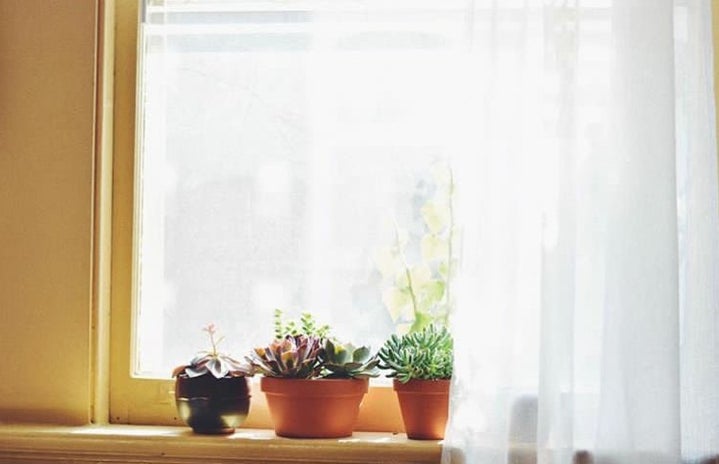Let’s face it… it’s hard to live sustainably in college. Between an on-the-go lifestyle, a limited budget, low-quality food choices, and a constant feeling of overwhelm about the state of the planet, it can be hard to think about “sustainability” when you’re just trying to get through your constantly piling-up workload and reading the headlines leaves any efforts feeling futile.
It’s important to recognize that any actions, no matter how small, contribute to the betterment of both your local community, and the environment as a whole. As the Office Coordinator of the Office of Sustainability here at Conn, I get to participate in some of the incredible student-led initiatives that serve to both inspire and facilitate change. Even at a small-scale, it is easy to see the benefits of framing college life through the lens of sustainability, and I want to stress that switching to eco-friendly practices does make a difference, no matter the level of commitment.
Without further ado, here are five tips that will help you live sustainably on a college campus:
- Invest in Reusable Dishware
-
College students live really busy lives, and when you’re running from place to place, it can be easy to fall into certain habits that rely on single-use dishware, whether it’s plastic utensils, a paper food container, or a cardboard coffee cup. Therefore, it’s important to build-up your arsenal of reusable utensils, plates, and cups, reducing overall waste and bolstering the efficiency of your consumption.
There are several cheap, and even free (depending on your campus) reusable options that can fit easily into your daily life. Reusable Starbucks mugs are typically $5 – $20 in store or online, and look chic no matter what you put in them. Additionally, there are several affordable options for silverware and dishes that are perfect for a dorm-room setting.
At Conn, our “Conn-tainers” program is free (you only get charged if you lose it), so you’ll always have access to a reusable container when you’re on-the-go during meals. Additionally, our on-campus coffee shops allow you to bring your own reusable mug, so you can sip without burning your hands… or filling up a landfill.
- Grow Herbs in Your Room
-
Looking for a little seasoning to spice up your life? Don’t drive to the grocery store and purchase any plastic containers—grow your own! Some of the best dorm room herbs include rosemary, chives, mint, and parsley. When I grew basil and dill in my room last semester, it literally changed my life. Growing plants in your dorm room allows you to practice your gardening skills and leaves you with a constant fresh supply of healthy flavors.
Trust me… it’s the best way to spruce up your Harris dining experience here at Conn.
- Buy Less
-
What’s the first of the three Rs? Reduce!
One of the easiest and most effective ways to help the planet is to simply buy less. This includes purchases like clothes, decorations, silly Amazon products, and even food. Almost 40% of all food is wasted in the United States, and 92 million tons of clothes-related waste is generated each year worldwide. In college, it’s not difficult to do your part in buying only what you need, reducing the amount of material that ends up in the landfill or ocean.
At Conn, the Office of Sustainability holds a yard sale every year before classes start, allowing students to thrift certain dorm room essentials at an extremely low cost. Donations are collected at move out. Additionally, The Dressing Room is an on-campus, free thrift shop run by the Office of Sustainability and Gender and Sexuality Programs, where students can both donate and shop for new looks. In terms of food, I recommend looking into whether or not composting is feasible, especially if you live in an apartment.
- Use Public Transportation as Much as Possible
-
On a campus surrounded by major roads and highways, it makes sense that cars are a want… but they’re not always a need. Especially when some students are inclined to drive from one end of the campus to another (a ten minute walk at most).
Transportation is the largest source of greenhouse gas emissions in CT, and although it’s not very conducive to ask college students to switch to an electric vehicle, there are plenty of alternatives to get you where you need to go, without hopping behind the wheel.
I recommend checking out the public transportation system near you! In New London, the SEAT Bus stops near the entrance of the Arboretum 17 times a day, Monday through Saturday, and our closest Amtrak station, Union Station, will take you to any of the major cities in the region. Additionally, our Spokespeople program allows students to rent bikes and longboards for free with a deposit. And remember, carpooling is always the way to go!
- Get Involved!
-
Almost every college has an organized group that champions sustainability on campus. At Conn, our Office of Sustainability hosts a Student Fellows program, where those who choose to become a Sustainability Fellow are placed on a different team each semester to complete a specific environment or social justice project. This semester, teams include the Sustainable Building Policy Team, which is looking to add green roofs into our campus building policy, and the Energy Builders team, which hosts an energy reduction competition between dorm buildings. There are also several student organizations that are environment- and climate-centered, including the CC Climate Collective and Oceana.
In 2023, it is imperative that sustainability is placed at the forefront of our lives if we hope to reverse some of the damages that humans have inflicted on the planet. Although it can be difficult to live a truly sustainable life in college, I hope that you find some inspiration in these tips, and I wish you luck in your eco-friendly endeavors!


